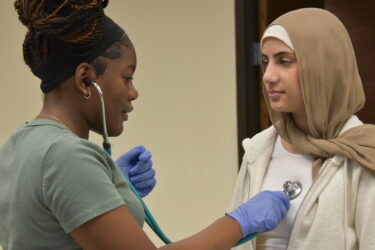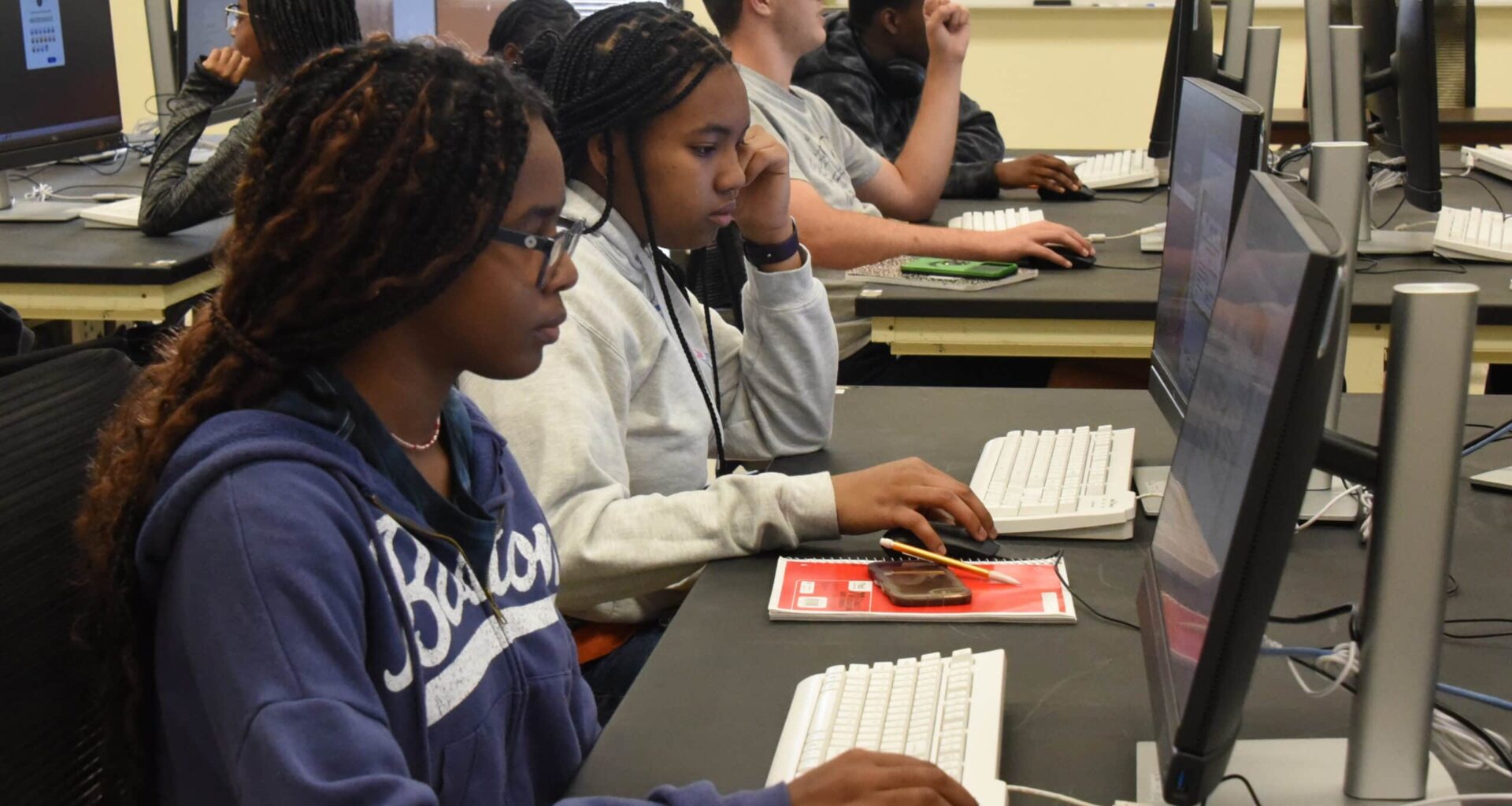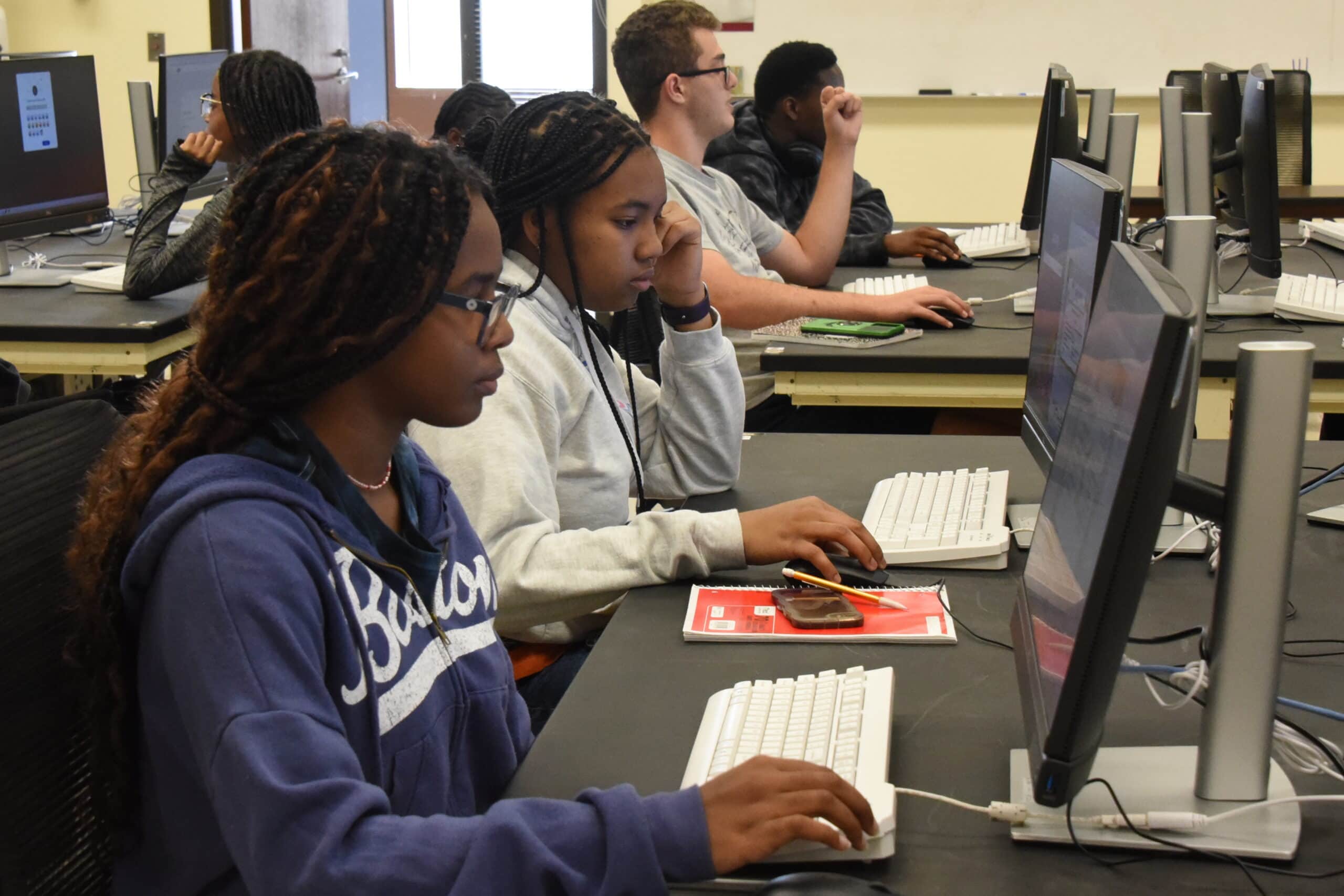Aug. 5, 2025 | Nearly two dozen junior high and senior high school students recently spent a week on the University of Arkansas for Medical Sciences (UAMS) campus for a new program that highlighted the importance of data science in health care.
The AR Health Data Scholars’ Summer Bootcamp, sponsored by UAMS Academic Pathways and Workforce Partnerships and funded by a Preventive Health and Health Services Block Grant through the Arkansas Department of Health, challenged the students to analyze publicly available health data using modern-day tools such as artificial intelligence.
The bootcamp was also held this summer in Fayetteville and Pine Bluff. The program was organized by Tai Robins, a doctoral candidate in the UAMS College of Medicine’s Department of Biomedical Informatics who served as site coordinator for each of the camps.
Adrian Price, Ph.D., a data scientist with a background in health economics, was the instructor for the Little Rock camp. He said the program introduced a young generation of technology users to the real-world impact of data analysis.
“AI is taking on a more prominent role in our world, and it’s important that everyone has the opportunity to get in on the ground floor,” he said.

Imani Smith (left), a rising ninth grader at Sylvan Hills Junior High School in Sherwood, uses a stethoscope to check another student’s heart rate during an activity that demonstrated how health professionals rely on data to inform their decisions in patient care.
Early in the week, Price led the students through a variety of activities that showed how data can be used to tell a story. In one exercise, he asked them to recount the “hero’s journey” in their favorite video games, noting that data projects apply a similar narrative structure in identifying problems and presenting solutions.
In another segment, students divided into pairs and used stethoscopes to check each other’s heart rate. As they logged the results, they learned about how health professionals rely on data to inform their decisions in patient care.
The students put these lessons into practice by conducting group projects that covered topics such as prescription drug abuse, diabetes, COVID-19 and medical marijuana. Each team conducted background research and used artificial intelligence to analyze the data. After identifying trends or health outcomes, they used those findings to prepare presentations for their classmates, invited guests and a panel of three evaluators.
“Using AI as a tool is more important and impactful than using it for casual consumption,” Price said. “We wanted these students to believe in themselves and understand how they can be a part of the technology industry.”
Keaton Walls, a rising 10th grader at Little Rock Central High School, said his group examined demographic data from the state’s medical marijuana program. Noting that he’s interested in software development, he said the camp provided him with insights about technology that might help him in the future.
“This program has taught us a lot about how to use AI and analyze data,” he said.
Imani Smith, a rising ninth grader at Sylvan Hills Junior High School in Sherwood, was part of a team that focused on Arkansas’ Prescription Drug Monitoring Program. Using state data on opioid abuse, the students identified trends and explained how the program helps prevent the overprescription of certain medications.
Smith said she has considered a career in pediatric nursing but that the camp has opened her eyes to other options in the health care field.
“I feel like this experience has shown me that health care is what I want to do, and now I’m excited to explore different parts of it,” she said.
Kenya Eddings, director of the Arkansas Minority Health Commission, and her team traversed the state with the bootcamp, taking the commission’s Mobile Health Unit to Fayetteville and Pine Bluff.
The Little Rock scholars also chatted with Austin Porter, Dr.PH., MPH, epidemiologist and chief science officer for the Arkansas Department of Health (ADH) as well as an assistant professor in the UAMS Fay W. Boozman College of Public Health. The data sets used for this program were derived from the ADH and Centers for Disease Control and Prevention.
“It was amazing to watch my brainchild come to fruition as the scholars used the available tools to analyze public health data and even more so when I watched their presentations at the end of each week,” Robins said. “The insights they provided at such young ages were extremely impressive.
“Many thanks to all those who help make this possible, including speakers from across the nation,” she said. “Many more thanks to Pathways Academy for approving and supporting this vision.”
Pathways Academy — part of UAMS Academic Pathways and Workforce Partnerships — is a statewide educational and community engagement program that prepares K-12 students for opportunities in science, technology, engineering, mathematics and health sciences (STEM-H) disciplines.

